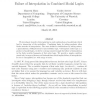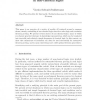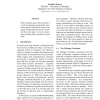103
click to vote
JUCS
2010
14 years 11 months ago
2010
: We introduce a first-order temporal logic for reasoning about branching time. It is well known that the set of valid formulas is not recursively enumerable and there is no fini...
NDJFL
1998
15 years 8 days ago
1998
We investigate transfer of interpolation in such combinations of modal logic which lead to interaction of the modalities. Combining logics by taking products often blocks transfer...
96
Voted
AMAI
2007
Springer
15 years 22 days ago
2007
Springer
This paper is an overview of a variety of results, all centered around a common theme, namely embedding of non-classical logics into first order logic and resolution theorem prov...
EACL
2003
ACL Anthology
15 years 2 months ago
2003
ACL Anthology
Finite structure query (fsq for short) is a tool for querying syntactically annotated corpora. fsq employs a query language of high expressive power, namely full first order logi...
KBSE
1995
IEEE
15 years 4 months ago
1995
IEEE
The KBSE community is actively engaged in finding ways to represent software and the activities that relate to various stages in its lifecycle. While the wealth of modeling activ...
112
click to vote
BIRTHDAY
1997
Springer
15 years 4 months ago
1997
Springer
We compare the expressive power on finite models of two extensions of first order logic L with equality. L(Ct) is formed by adding an operator count{x : ϕ}, which builds a term ...
100
Voted
TACAS
2004
Springer
15 years 6 months ago
2004
Springer
Abstract. The Succinct Solver Suite offers two analysis engines for solving data and control flow problems expressed in clausal form in a large fragment of first order logic. Th...
111
click to vote
ECAI
2004
Springer
15 years 6 months ago
2004
Springer
Attempts to use finite models to guide the search for proofs by resolution and the like in first order logic all suffer from the need to trade off the expense of generating and m...
116
click to vote
LPAR
2005
Springer
15 years 6 months ago
2005
Springer
Separation logic is a subset of the quantifier-free first order logic. It has been successfully used in the automated verification of systems that have large (or unbounded) inte...
87
Voted
TYPES
2007
Springer
15 years 6 months ago
2007
Springer
Abstract. We propose syntax and semantics for systems of intuitionistic and classical first order dependently sorted logic, with and withlity, retaining type dependency, but other...



